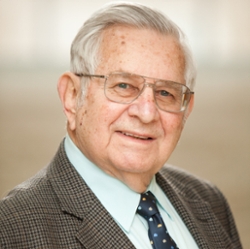Raymond Krizek Recognized with ASCE OPAL Leadership Award
The award honors his achievements in civil engineering education
Northwestern Engineering’s Raymond Krizek received recognition from the American Society of Civil Engineers (ASCE) as the winner of a 2020 Outstanding Projects and Leaders (OPAL) award.
 Krizek received the OPAL leadership award in education for demonstrated excellence in furthering civil engineering education. The awards honor civil engineers for career achievements in five categories: construction, design, education, government, and management.
Krizek received the OPAL leadership award in education for demonstrated excellence in furthering civil engineering education. The awards honor civil engineers for career achievements in five categories: construction, design, education, government, and management.
Krizek, Stanley F. Pepper Professor of Civil and Environmental Engineering, serves as the director of the Master of Project Management program and the Master of Executive Management for Design and Construction program. He joined the McCormick School of Engineering faculty in 1963 after earning his PhD in civil engineering from Northwestern, his MS in civil engineering from the University of Maryland, and his BE in civil engineering from Johns Hopkins University.
From 1980-1992, Krizek served as the chair of Northwestern Engineering’s Department of Civil and Environmental Engineering. His research interests include mechanical properties of grouted sands, disposal of waste slurries, and engineering behavior of dredged materials. Krizek served as the first president of the Geo-Institute of ASCE. He was elected to the National Academy of Engineering in 2001 and became an honorary member of ASCE in 2002. His other accolades include the membership in the Spanish Royal Academy of Engineering, Honoris Causa Doctorate from Universidad de Cantabria, Spain, Palmes Academiques from the French Ministry of Education, the Hogentogler Award from the American Society for Testing and Materials (ASTM), the Walter L. Huber Prize from ASCE, and the Terzaghi Award and the Wallace Hayward-Baker Award, both from the Geo-Institute of ASCE. He has published more than 300 articles in journals and proceedings, and he is the editor of 10 books.
Krizek’s research and collaborations have resulted in environmentally improved methods for the disposal of large-volume industrial waste slurries, for example red mud tailings and flue gas desulfurization sludge, and polluted sediments dredged from the nation’s waterways. His work also contributed materially to defining the characteristics of microfine cement grouts and establishing the criteria for their use for soil improvement. His research has provided the rationale and data for several ASTM standards for preparing and testing specimens of grouted soils to determine their properties.
This year’s OPAL leadership award winners will be honored at the OPAL Gala on March 13, 2020, in Washington, DC.